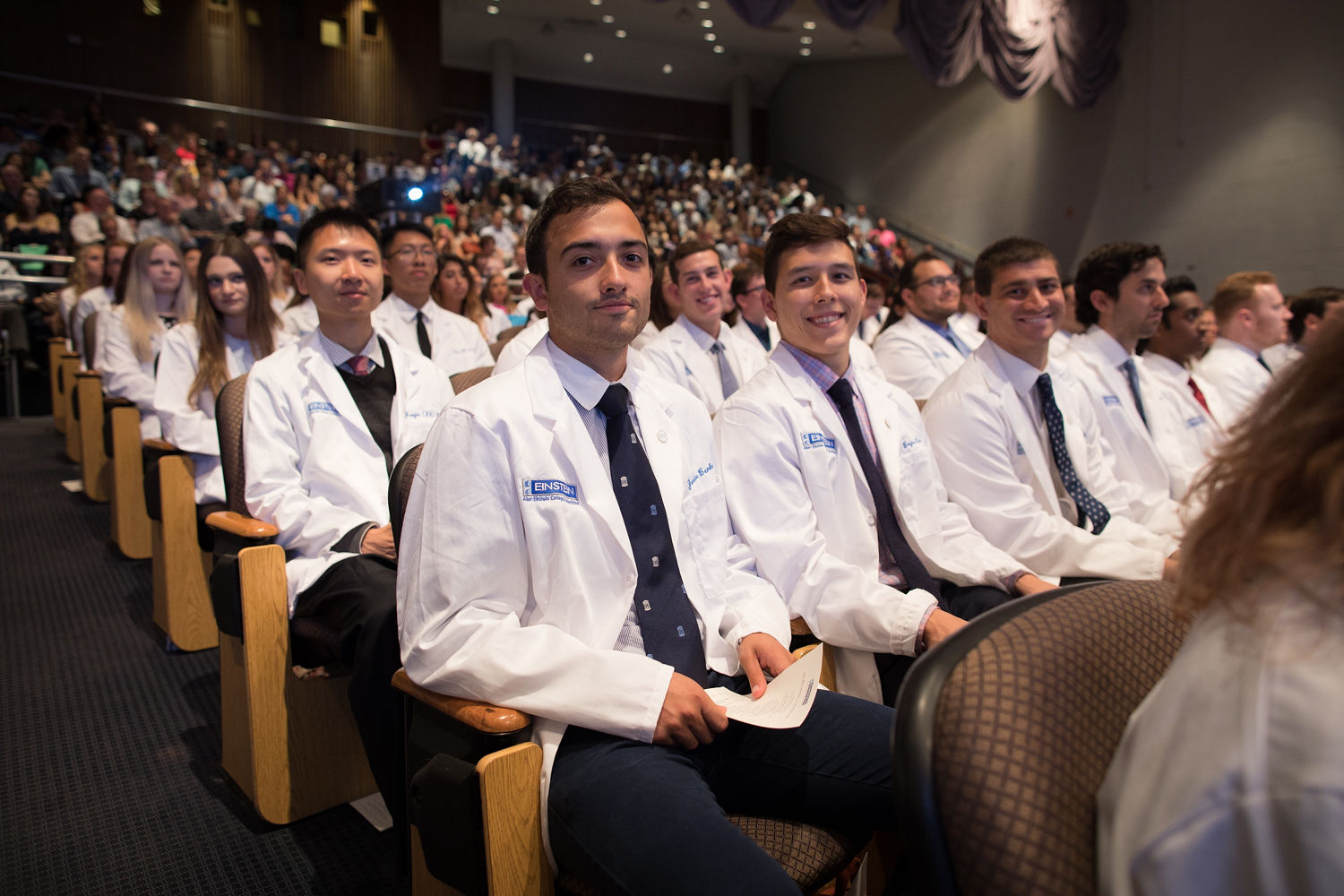
Editors’ note: The transition from college to medical school has been described as being akin to the difference between drinking water from a garden hose and drinking from a fire hose. There’s an overwhelming amount of new information, surroundings, concepts, and emotions to grapple with. During Orientation week, Einstein faculty and associates shared their thoughts with the Class of 2023 about how first-year students should prepare for medical school and beyond. We’ve gathered some of these words of wisdom in this blog post.
Getting Started in Medical School
“I want to congratulate you because it’s difficult to get to this stage of the process. It’s a bit arduous, but it’s completely rewarding and gets more rewarding as you go forward. Congratulations on making it this far; it’s our job to make sure that you’re successful.”
— Gordon Tomaselli, M.D., the Marilyn and Stanley M. Katz Dean at Albert Einstein College of Medicine
***
“The first two years that you’re about to enter are to provide you with information that you must turn into knowledge with the hopes that eventually all of this turns into wisdom. The way to do that is to study diligently and compulsively and with integrity.”
— Stephen Baum, M.D., senior advisor for students; professor of medicine (administration) and professor of microbiology & immunology
***
“We talked a lot about the ‘imposter syndrome,’ like any minute someone would figure out you didn’t really belong.… For anybody who’s feeling like that, or that we’re about to figure it out, it’s not the case. You do belong here; we really believe in that.”
— Allison Ludwig, M.D. (Class of 2004), associate dean for student affairs and associate professor of medicine
Caring for―and Learning from―Patients
“As a physician, you will continually be educating your patients and yourselves. You will teach your peers, your residents, your physician assistants, your radiology technicians, and so many others. You’ll need to become masterful at communicating complex issues in clear and understandable ways. You will deliver heartbreaking news and you will also cure―and guide. Always remember to be humble. You will have amazing skills and vast knowledge. But you can always, always learn more, especially from your patients.”
— Josh Nosanchuk, M.D., senior associate dean for medical education and professor of medicine (infectious diseases) and of microbiology & immunology
***
“Being a physician is a privilege. And part of that privilege is examining patients. A patient lets a stranger touch him or her. In very few other scenarios in our society would that be encouraged; it might, in fact, be illegal. Always remember that when performing physical exams, you must maintain respect, sensitivity, and confidentiality in order to be a true professional.”
— Felise Milan, M.D., director, Clinical Skills Center, and director, Introduction to Clinical Medicine programs
***
“Don’t ever forget the honor is ours, not the patients’. We should be humbled that we are being given the opportunity to take care of them. We should never forget that they give us a lot more than we give them.”
— Jay M. Feingold, M.D., president, Einstein Alumni Association
On Being a Physician
“Do any of you worry about what’s going to happen to you as you go through medical training and whether you’re going to change? Do you worry about whether you will have time for family? Do you worry about becoming less compassionate, less patient? And so, my question for you is: how do you hold on to your best self while you’re going through your medical training?”
— Paul Gross, M.D., assistant professor of family and social medicine and editor-in-chief of Pulse—voices from the heart of medicine
***
“The most important characteristic that I believe you can develop is compulsiveness—not obsessive compulsiveness, but compulsiveness. And it’s more important than brilliance, actually. So if I have a physician I’m going to go to, I’d like him or her to be a brilliant, compulsive physician. I had the privilege of being chair of medicine at a hospital affiliated with this institution. One of the doctors there was someone whom every other doctor wanted to go to. Was he the smartest of all of the physicians at that institution? Absolutely not. But what you knew about the doctor was that if you were his patient, he would never, ever let any stone go unturned in getting you better. He would walk down the hall and grab the consultants and say, ‘You have to come see this patient with me.’ He knew what he knew. And he knew how to get everything done.”
— Dr. Baum
***
“I want you to always question why your patient has a disease. Why this person? Why now? What could have been done to prevent this happening to this patient or others, and what more is needed to provide better preventive and/or therapeutic care to future patients? In your careers, each one of you will have opportunities to develop innovations that will improve the human condition.”
— Dr. Nosanchuk
***
“I guarantee you will have the opportunity to see changes in medicine that will be miraculous; wonderful events not only for society, but for humanity in general.”
— Dean Tomaselli

